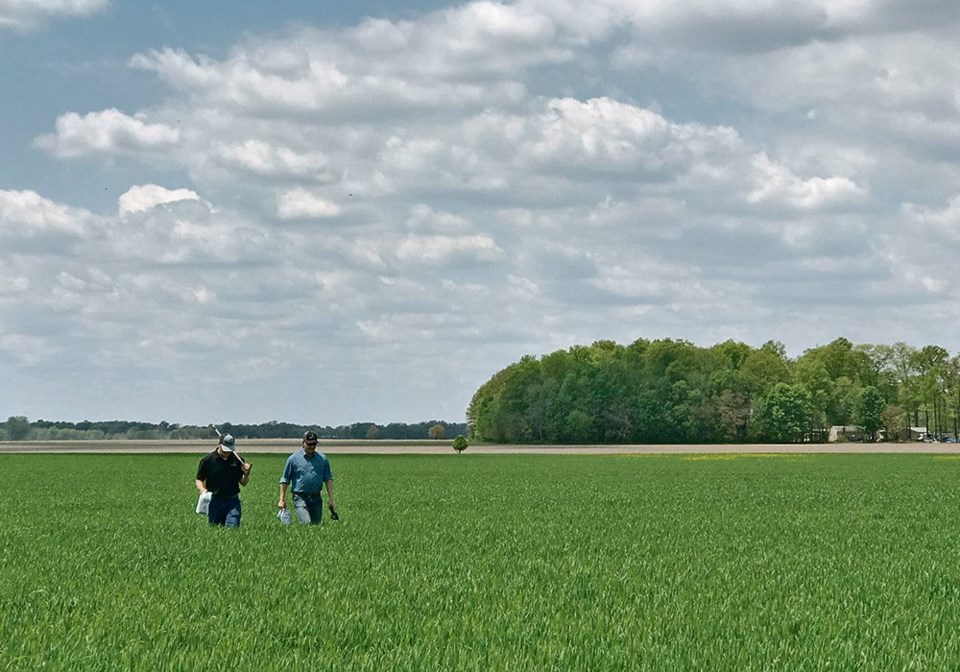Access to data from large-scale field trials is a stumbling block many companies face when moving toward the end of the research and development stage of new cropping products.
This is the space IN10T (pronounced “intent”) has targeted in the Canadian market, so that its clients can better understand both the user experience of their products and where they fit in on Canadian farms.
“Where we fit in is to help remove barriers when it comes to getting data off a farm and understanding what growers perceive about a product, and helping with adoption or commercialization,” said Patrick Comte, president of the Canadian division of IN10T.
There are already research organizations on the Prairies that test new products and growing strategies, from Ag Canada and universities programs, to on-farm research stations.
These organizations provide much of the research grounding for the best management practices agronomists use to develop their recommendations.
However, there is a capacity issue when it comes to the number of field-scale trials these organizations can run each year.
So, if a company can show third-party trialing data, at field scale, and from farms in their region, agronomists are more likely to consider the product.
FarmBusiness network also runs large-scale field trials, and then uses the information to help its growers make more informed decisions on the products and varieties that work the best in their growing region.
IN10T, on the other hand, is more of a pure-play company that specializes in conducting trials to help their customers launch products in specific regions and use cases where they are most likely to be effective.
It does this by first establishing a community of innovative growers, the company calls its FarmerTrials Network.
“We’re paying growers for the time and for them to share the data. They get involved as we work with ag businesses on understanding their technology and where it fits,” Comte said.
“We work with the farmers that put it on the farm, and then we collect the data.”
It’s easy to understand how field trials work, but they can be tricky to pull off with clean, meaningful data.
Because IN10T’s end goal is the data, it can train its staff to have the expertise needed to achieve clean, reliable and relevant information.
IN10T also develops its technology and process in a way that focuses on getting good data off farms.
For instance, IN10T built a digital platform called INvision that is customizable for its ag business customers.
Its focus on the collection of trial data sets for ag companies sets it apart from other farm management programs that are built to meet farmer’s needs.
IN10T started in 2016, but the company’s INvision platform was launched last year.
“We customize it based on what they’re looking for, and then we will take data from the farm in any capacity with things like soil and weather and satellite imagery and help pull the pieces together in one space,” Comte said.
“We also have an in-field app that pulls in the agronomy and pictures and videos from the field back into the platform to try to help tell a story around the entire trial journey.”
The web-based interface can bring in information from just about any source, including other farm management software programs.
Comte said the insight derived in the INvision platform is where much of the value IN10T offers its clients comes from.
“Pulling that data in one spot. where we can aggregate that data across multiple variables and find how the product fits,” he said.
“It’s more than just trial work. It could be anything from looking at commercial fields, to looking at stewarded fields, the same track over multiple years and seed production fields.”
The focus on qualitative data, from pictures to notes on user experience helps clients have a better understanding of what to expect once their product is rolled out.
“You will get their experience in season and figure out how was the packaging? How did it go through the equipment? And what is seen in the field?” Comte said.
“Then what we’ll do is follow up again after harvest and we’ll do another survey that goes out to all the farmers in our network that are part of the project. To see what has changed, what they’ve seen after harvest and how it fits into their operation?”
More Canadian farmers likely to sign up
There are 1,500 farmers signed up to IN10T in the United States and about 100 farmers in Canada, but the company plans to add hundreds more north of the border next year.
The amount of money producers receive from participating in the IN10T FarmerTrials Network varies because each project has different levels of complexity and engagement.
However, Comte said payments to farmers will be $1,000 or more.
“We want to make sure that they’re engaged and that they feel really compensated for their effort, because it does take time and energy to do a trial properly,” Comte said.
It’s free to sign up to the FarmerTrials Network, which gives access to the IN10T website where all of the trials that are underway each year are posted, and where growers can sign up for trials they are interested in.
In some instances, growers may want to test out one of the products to see how it performs on their farm anyway, so the added money and guidance from the IN10T staff and platform are an added bonus.
Plus, the program can also be a way for participants to get access to new products to test on their farm they would not otherwise have access to.





